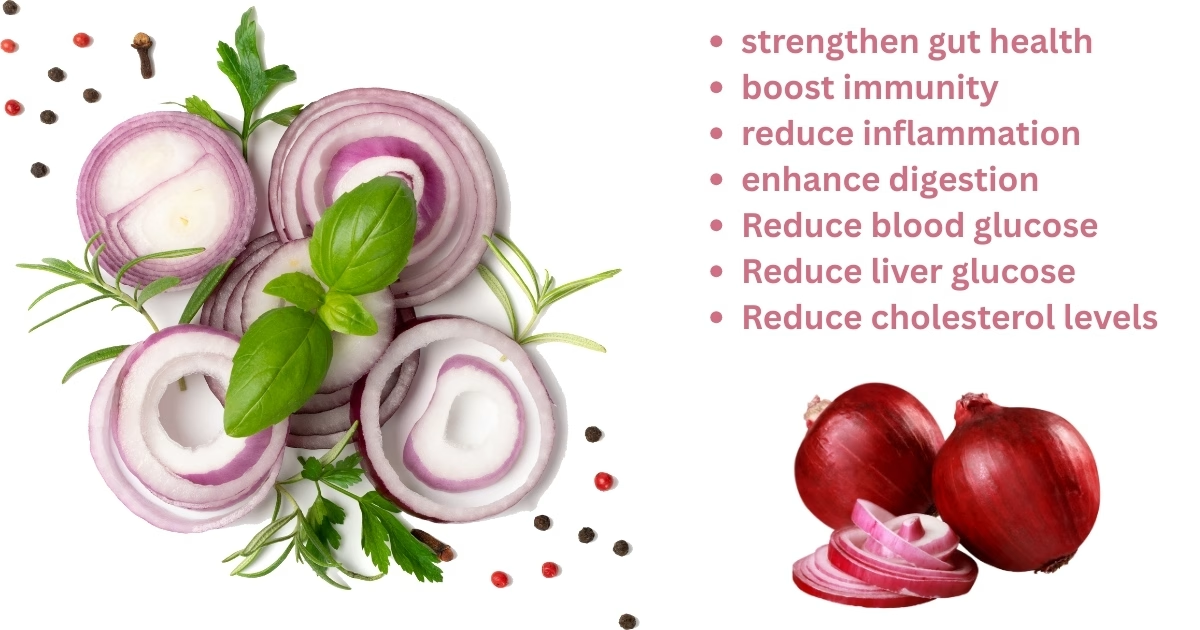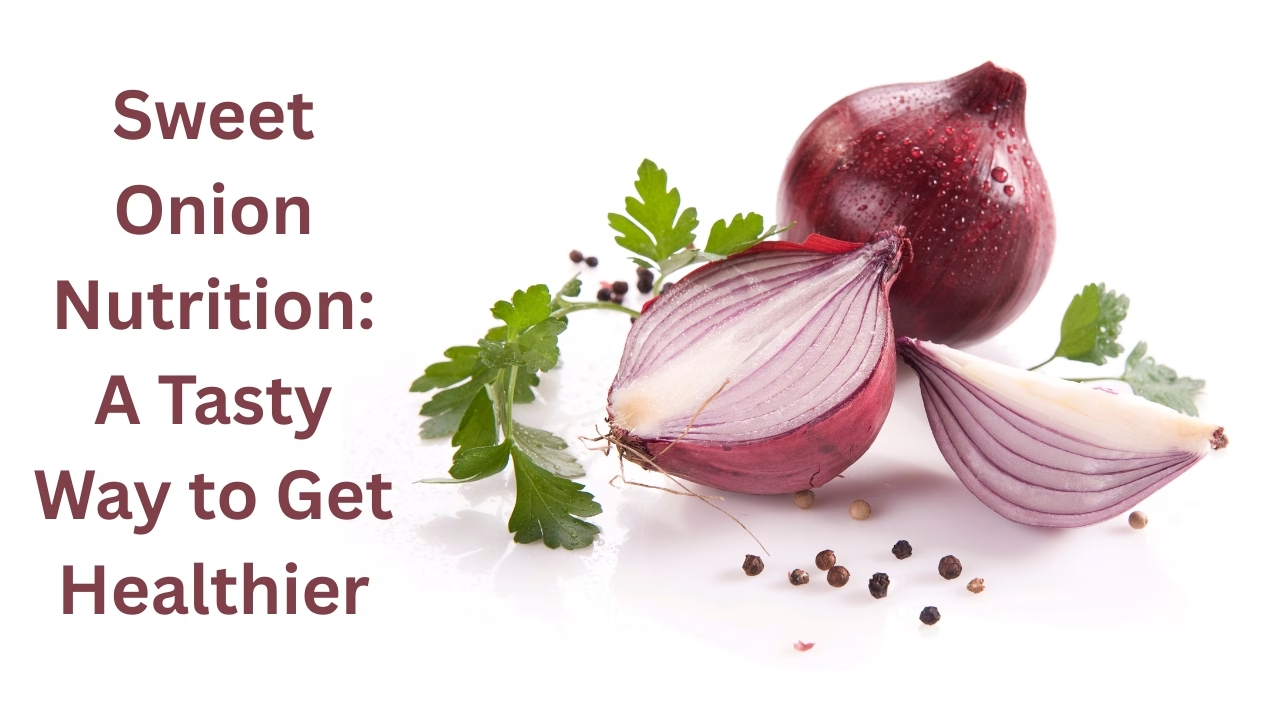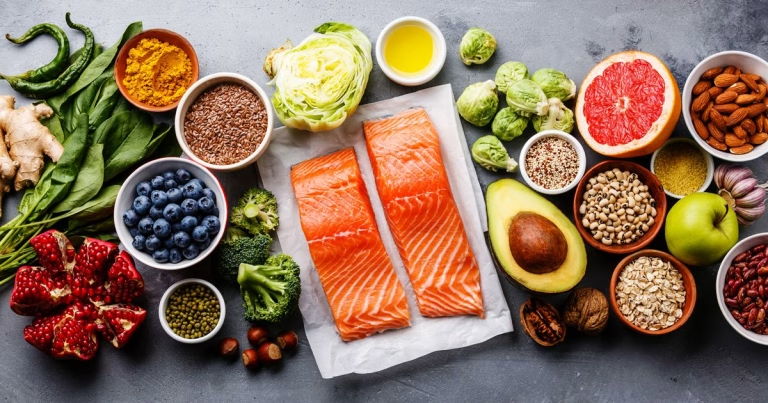Sweet Onion Nutrition: A Tasty Way to Improve Your Health
An essential component in the kitchen, onions enhance the taste of almost any savory dish we make. Sweet onions, however, are unique among the various varieties of onions. More importantly, they are full of health benefits and are milder and juicier. The magic of sweet onions is when you bite into a fresh salad or sandwich and experience the crisp sweetness of an onion without getting your eyes water!
Beyond their delicious taste, these onions are nutrient-dense foods you might not be aware of. It’s provide more than just a delicious flavor, whether you choose to eat them raw, grilled, or tossed in a salad. Let’s examine their nutritional makeup, potential health advantages, and dietary integration.

What are sweet onions?
These are a type of onion that is known for being mild and having a lot of water in it. These onions are different from regular yellow or red onions because they have less sulfur and more sugar. Regular onions have a strong, sharp taste. This makes them taste sweeter and more delicate, which is great for dishes where you don’t want the onion to take over the other flavors.
Vidalia (from Georgia), Walla Walla (from Washington), and Maui (from Hawaii) are the most popular kinds of sweet onions. Each type has its own growing conditions that affect its flavor and texture, but they all have the same trait: they are sweeter and milder than other types.
Sweet Onions Nutritional Value
Sweet onions are a nutritious addition to practically any meal because they are high in nutrients and low in calories. Their nutritional value per 100 grams is as follows:
-32 kcal of calories
-7.6g of carbohydrates
-0.9g of dietary fiber
-0g of sugars
-0.8g of protein
-0.08g of fat
-8 mg of sodium
-119 mg of potassium
-20 mg of calcium
-0.26 mg of iron
Sweet onions are a great choice for anyone wishing to enhance their meals without consuming additional calories because of their low calorie and fat content. The small quantity of potassium and fiber is also good for digestion and heart health.
The health benefits of sweet onions
Full of antioxidants
Quercetin and sulfur compounds are two powerful antioxidants found in sweet onions. They help fight oxidative stress and inflammation in the body. These antioxidants help lower the risk of getting long-term diseases like cancer and heart disease. Eating sweet onions is a great way to keep your body safe from free radicals that can hurt it.
Helps the immune system work well
These onions are a great source of vitamin C, which is important for keeping your immune system strong. Vitamin C helps your body fight off infections and helps wounds heal. You can keep your immune system strong and better able to handle everyday health problems by adding sweet onions to your meals.
Helps with digestion
These onions are a good source of dietary fiber, which is important for keeping your digestive system healthy. Fiber helps your digestive system work well by keeping your gut microbiome healthy and making sure you have regular bowel movements. Adding sweet onions to your meals can help your digestion and reduce bloating.
Good for your heart
Sweet onions have sulfur compounds that are known to lower cholesterol and blood pressure, both of which are important for keeping your heart healthy. Eating sweet onions on a regular basis may lower the risk of heart disease, so they are a great food choice for people who want to keep their heart healthy.
Health of the bones
Believe it or not, these onions are good for your bones too! Studies have shown that eating onions on a regular basis can help older people have stronger bones and lower their risk of osteoporosis. Sweet onions have a small amount of calcium and other minerals that are good for your bones. This means that as you get older, your bones will stay strong.
How to Add Sweet Onions to Your Diet
Now that you know how good sweet onions are for your health, you’re probably wondering how to use them in your cooking. The good news is that these onions are very flexible and can be used in many different recipes. Here are some ways to enjoy them:
In salads raw
Fresh salads are great with thinly sliced sweet onions. They give a crunchy texture and a little bit of sweetness without being too much. Add leafy greens, cucumbers, and tomatoes to them for a salad that is both refreshing and tasty.
For Sandwiches and Wraps
You can put these onions on burgers, wraps, or sandwiches. Their sweet taste goes well with meats, cheeses, and sauces, adding a tasty twist to your sandwich. Put them on a veggie wrap or a classic BLT!
In relishes and salsas
Chopped sweet onions add a lot of flavor to homemade salsas and relishes. Their mild flavor goes great with tomatoes, peppers, and cilantro. Great for chips, grilled meats, or tacos!
On the grill or in the oven
When you grill or roast these onions, the natural sugars come out and the taste gets better. Cut them up, mix them with some olive oil, salt, and pepper, and roast or grill them until they are golden and soft. These caramelized onions are great on steaks, chicken, or salads, or as a side dish.
In Soups and Stews
You can add these onions to soups and stews to make them richer and sweeter. They go well with many types of vegetables and meats, making the flavors of your food more interesting and complex. Put them in your next pot of French onion soup!
Questions that are often asked (FAQs)
Q1: Can people with diabetes eat sweet onions?
Yes, these onions are a great choice for people with diabetes. Because they have a low glycemic index, they won’t raise blood sugar levels. Sweet onions are also a good food for people with diabetes because they have fiber that can help keep blood sugar levels stable.
Q2: Do sweet onions make it hard to digest?
Fructans, a type of FODMAP, are found in sweet onions. These can make people with irritable bowel syndrome (IBS) feel bad in their stomachs. You should not eat too many sweet onions if you have a sensitive stomach or IBS.
Q3: What is the best way to keep sweet onions?
Put these onions in a cool, dry place, like a pantry or cupboard, where they won’t get direct sunlight. If you keep them in the right way, they can last for weeks. After cutting them, put the onions in an airtight container in the fridge and use them within a few days.
Q4: Is it bad for your health to eat sweet onions?
Most people can eat these onions without any problems. Some people, though, may have allergic reactions or stomach problems. It’s best to talk to a doctor if you’re not sure if you should eat sweet onions.
In conclusion
Sweet onions are a fantastic source of nutrients in addition to being a tasty addition to your meals. Rich in antioxidants, they also help with digestion, heart health, immune system support, and even bone health. They are also very adaptable and can be used in a variety of recipes, such as savory grilled foods, hearty soups, and fresh salads.
Enjoy the many health advantages of sweet onions by reaching for one the next time you’re in the kitchen. These onions are the ideal ingredient to improve your health and cooking, whether you’re trying to strengthen your immune system, improve digestion, or add flavor to your meals.







